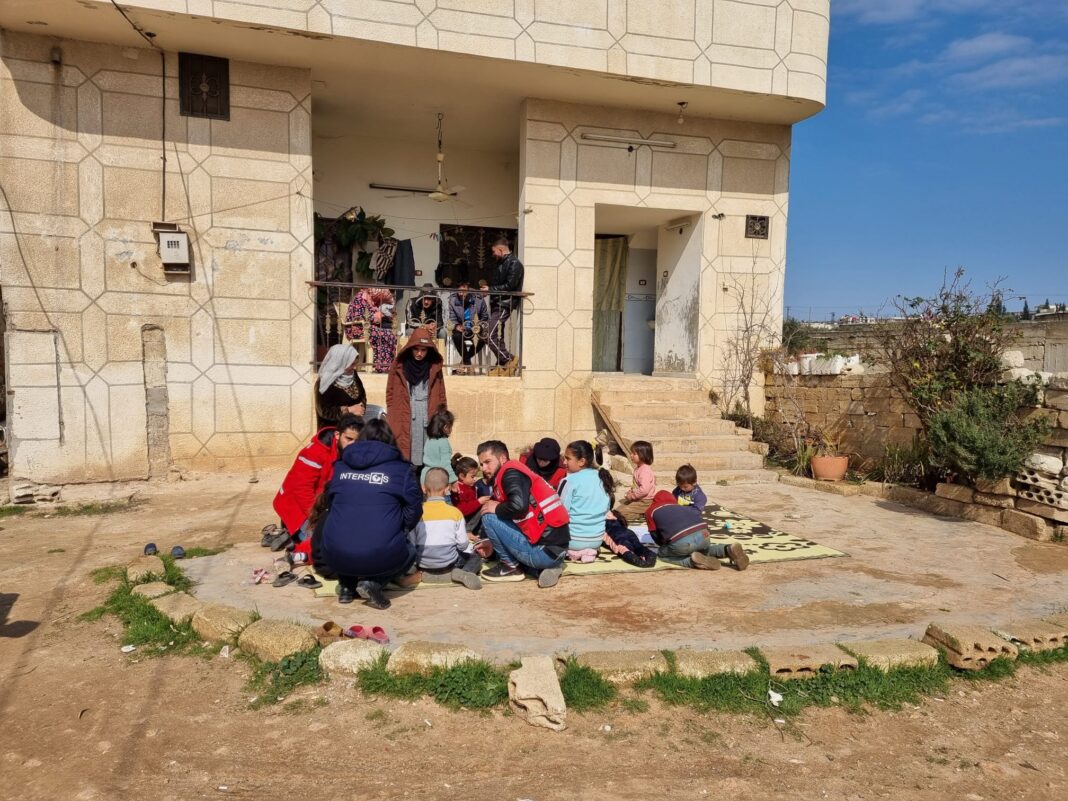A testimony from the earthquake-ridden areas of Syria from our partners, Italian humanitarian organization INTERSOS.
Post-traumatic stress symptoms widespread among women, men and children. A shock that spares no one. And which goes hand in hand with the vast, and growing, basic material needs that are increasingly going unmet. This is what emerges from the first rapid needs assessment conducted by INTERSOS operators in the areas of Syria affected by the earthquake on 6 February in which our organisation operates.
In the face of wintry weather conditions, with temperatures often below zero, the chronic lack of electricity (which in some areas is not available for more than an hour a day) and heating systems weighs heavily. Seventy per cent of respondents express an urgent need for winter clothing and cooking utensils, and 60 per cent require blankets. With regard to access to health services, in an area where the health system was already extremely fragile after 12 years of conflict and humanitarian crisis, 87% of people cannot access or have significantly limited access to second level health care while 75% complain of a lack of essential medicines.
Access to water and sanitation is also a major concern in view of the cholera epidemic that has been affecting several regions for months. One hundred per cent of respondents require hygiene kits and 56% require accessible toilets and latrines. In addition, the destruction of the earthquake had a strong impact on the food market, with 100 per cent of those surveyed reporting large price changes and 71 per cent reporting that the shock had reduced their ability to produce or purchase food.
As the magnitude of the immediate impact and the long-term consequences of the earthquake become more apparent, Intersos is working to scale up its operational response. Based on information gathered directly from those affected by the earthquake, as well as observations provided by Intersos teams on the ground, the initial first aid response, with the deployment of four mobile medical teams in Hama Governorate and the southern area of Idlib, will be expanded and integrated into a broader, multi-sectoral approach, as well as assessing the condition of temporary shelter buildings. As we observe an extreme need for material assistance, we are purchasing, collecting and distributing essential goods, including winter kits, hygiene and so-called dignity kits (containing feminine hygiene and health products). We will continue to ensure that medical units can provide effective care in both mobile and static modes, supporting them with the provision of pharmaceuticals, consumables and medical equipment. We aim to address psychological distress and trauma management by providing psychological first aid and counselling to those directly affected by the disaster.
“What we are facing is a sudden-onset emergency, caused by a large-scale natural disaster, which is evolving into a long-term crisis, with serious consequences for the affected population,” emphasises Martin Rosselot, Intersos Regional Director for the Middle East. “We must strive to ensure the continuity of our humanitarian support and continue to inform the public, urging them not to forget the needs of the population after the first response dictated by emotion. There is and, unfortunately, will still be much to be done for humanitarian workers on the frontline to save lives and prevent further suffering”.
Cover image: Own work, INTERSOS, 2023.
























